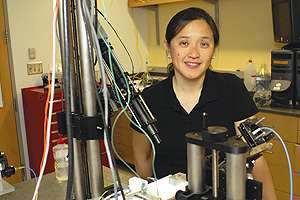Ka Yee Lee, Associate Professor in Chemistry and the College
By Steve KoppesNews Office
 Ka Yee Lee (Photo by Beth Rooney) | |
During her first academic year on the Chicago faculty as an assistant professor in 1998 to 1999, Ka Yee Lee was assigned to teach the second quarter of the three-quarter honors sequence in General Chemistry. Teaching the first quarter was Stuart Rice, the Frank P. Hixon Distinguished Service Professor Emeritus in Chemistry and the College.
“I did go and sit in some of his lectures just to see how it should be pitched here for the students at Chicago,” Lee said. “It was just mesmerizing. He’s such a great orator, and so you learn a lot.”
Lee, an Associate Professor in Chemistry, Institutional Biophysical Dynamics, the James Franck Institute and the College, has now replicated Rice’s instructional success. She has received a 2007 Quantrell Award for Excellence in Undergraduate Teaching, as Rice did in 1970.
General Chemistry courses begin at 8:30 a.m. Connecting with students at that early hour can pose a challenge, especially on cold winter mornings, Lee said. To get her students warmed up intellectually, she draws upon an interactive technique she learned from her graduate school adviser, Harvard University’s Eric Mazur.
Lee punctuates her lectures with conceptual questions, asking her students collectively to indicate their answers to a multiple-choice selection by a show of hands. This allows Lee to gauge how well the students grasp the new concept just presented in class, she said.
After the initial selection has been made, Lee instructs her students to confer about the questions with their classmates, then they vote again, and the responses usually converge toward the correct answer.
“The idea is that they learn a lot, not just from the lecturer, but from arguing with their peers and in defending their position.”
Mazur described this approach to reaching students in Peer Instruction: A User’s Manual. “This book is a culmination of his research on how you open up their minds and get them actively involved and engaged in this educational process,” Lee said.
Lee has mentored undergraduates and even high-school students in her laboratory almost from the beginning. The very first honors chemistry class she taught resulted in two undergraduates working in her laboratory the following summer. Both students are now enrolled in M.D./ Ph.D. programs at other institutions.
Two undergraduates currently work in Lee’s lab, and two others will start this summer, along with a high-school student from the University’s Laboratory Schools. Over the years, Lee has hosted five other students from the Illinois Mathematics and Science Academy in Aurora.
Still more high-school students are likely to find themselves working in Lee’s lab, thanks to a Dreyfus Foundation grant obtained by Laurie Butler, Professor in Chemistry and the College, for the Department of Chemistry. The grant provides summer laboratory support for new high-school graduates, which can be renewed for a second summer after their freshman year in college.
“The idea is that by the time they’ve returned to their home institution as a second-year in college, they would have two full summers of research under the belt, making them more competitive going into a particular research lab of interest in their home institution,” Lee said.
As Lee reflected on her commitment to young students and what it means to receive a Quantrell Award, she pointed out the collective nature of the accomplishment. Also critical to crafting a quality educational experience are people like Meishan Zhao, Laboratory Director for the General Chemistry sequence, and a team of dedicated teaching assistants.
“I’m the one standing in front of the students and so I get honored, but there are a lot of people who make sure that the crank is moving at the right speed and that nothing gets stuck,” Lee said.
“They’re always standing in the background just quietly doing their work without being acknowledged. It’s important to point out that it’s not just one person who makes the course go. It’s really a team.”
![[Chronicle]](/images/sidebar_header_oct06.gif)